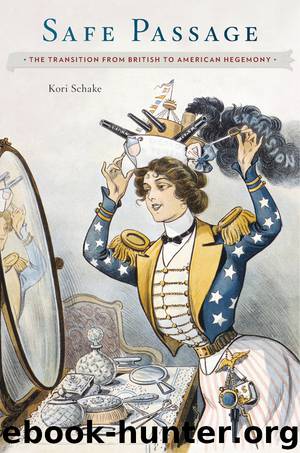Safe Passage: The Transition From British to American Hegemony by Kori Schake

Author:Kori Schake
Language: eng
Format: epub
Tags: History, Europe, Great Britain, General, Military, Wars & Conflicts (Other), United States, Political Science, International Relations, Security (National & International)
Publisher: Harvard University Press
Published: 2017-11-27T00:00:00+00:00
A Splendid Little War
For the Spanish-American War, the fight in the West (Cuba) gets most of the attention because the war began there, ease of access allowed extensive newspaper coverage, and the volunteer army units of the Rough Riders made such good press during the American invasion. But the Caribbean theater was less strategically important than the Pacific (the Philippines) in gauging a rising America. America did not need to open a Pacific theater of operations in order to relieve Spanish depredations in Cuba. Doing so was an opportunistic choice; what was undertaken as a war measure became a strategic redirection for the country.48
The choice made tactical sense, pressing Spain’s overstretched naval forces and threatening the government with loss of possessions beyond Cuba unless American demands about Cuba were met. American war plans dating back to 1896 included a feint against Spanish forces in the Pacific just to ensure its fleet was tied down there.49 But sailing time between the Atlantic and Pacific Oceans meant effectively that fleets in the two theaters were not fungible.
On April 25, 1898, President McKinley declared war on Spain, and Spanish control of Cuba was quickly overturned. Spanish control of Manila Bay fell even faster: the American navy under Commodore George Dewey defeated the Spanish fleet in a single engagement without losing a ship.50 Defeating Spain was not the end of hostilities in the Philippines, however, because Germany moved to challenge American control. Kaiser Wilhelm II demanded a cession (a share of commercial activity and location from which to conduct trade), declaring that the Americans were no match for the combined German and Spanish effort. (The Kaiser was unaware that the Spanish effort already lay on the seabed of Manila Harbor). He, too, saw commonality between Britain and the United States, proclaiming that “the United States with Monroeism is nearly as much in the way of Powers desiring to expand as Great Britain.51
Dewey’s fleet was not the peer of the German flotilla assembled in Manila Bay. The German squadron consisted of five men of war, two of which had greater displacement than any vessel in Dewey’s command; they also had aboard fourteen hundred infantrymen.52 German vessels began sounding the harbor, violated Dewey’s blockade regulations, moved to resupply Spanish forces aground, and even sought a naval base at Subic Bay.53 But American war efforts had received invaluable assistance by aligning with the Philippine independence movement: Dewey knew the harbor wasn’t mined and knew the extent of German collusion with Spain aground because of Philippine intelligence.
American war efforts received even more important assistance from Great Britain. Britain was officially neutral, but practiced “a benevolent neutrality which left no question as to which belligerent she favored.”54 British consuls in Spanish territories accepted responsibility for American nationals, even feeding them in Cuba. In Cairo, Gibraltar, and Singapore, British diplomats facilitated American efforts and inhibited those of Spain. Britain provided the negotiating intermediary for a clandestine agreement between Spain and America on terms for the surrender of Manila.55 Britain controlled
Download
This site does not store any files on its server. We only index and link to content provided by other sites. Please contact the content providers to delete copyright contents if any and email us, we'll remove relevant links or contents immediately.
| Arms Control | Diplomacy |
| Security | Trades & Tariffs |
| Treaties | African |
| Asian | Australian & Oceanian |
| Canadian | Caribbean & Latin American |
| European | Middle Eastern |
| Russian & Former Soviet Union |
The Secret History by Donna Tartt(16684)
The Social Justice Warrior Handbook by Lisa De Pasquale(11499)
Thirteen Reasons Why by Jay Asher(7815)
This Is How You Lose Her by Junot Diaz(5809)
Weapons of Math Destruction by Cathy O'Neil(5061)
Zero to One by Peter Thiel(4841)
The Myth of the Strong Leader by Archie Brown(4798)
Promise Me, Dad by Joe Biden(4463)
Beartown by Fredrik Backman(4448)
How Democracies Die by Steven Levitsky & Daniel Ziblatt(4434)
Stone's Rules by Roger Stone(4427)
The Fire Next Time by James Baldwin(4357)
100 Deadly Skills by Clint Emerson(4095)
A Higher Loyalty: Truth, Lies, and Leadership by James Comey(4046)
Rise and Kill First by Ronen Bergman(4029)
The David Icke Guide to the Global Conspiracy (and how to end it) by David Icke(3900)
The Farm by Tom Rob Smith(3884)
Secrecy World by Jake Bernstein(3794)
The Doomsday Machine by Daniel Ellsberg(3743)
